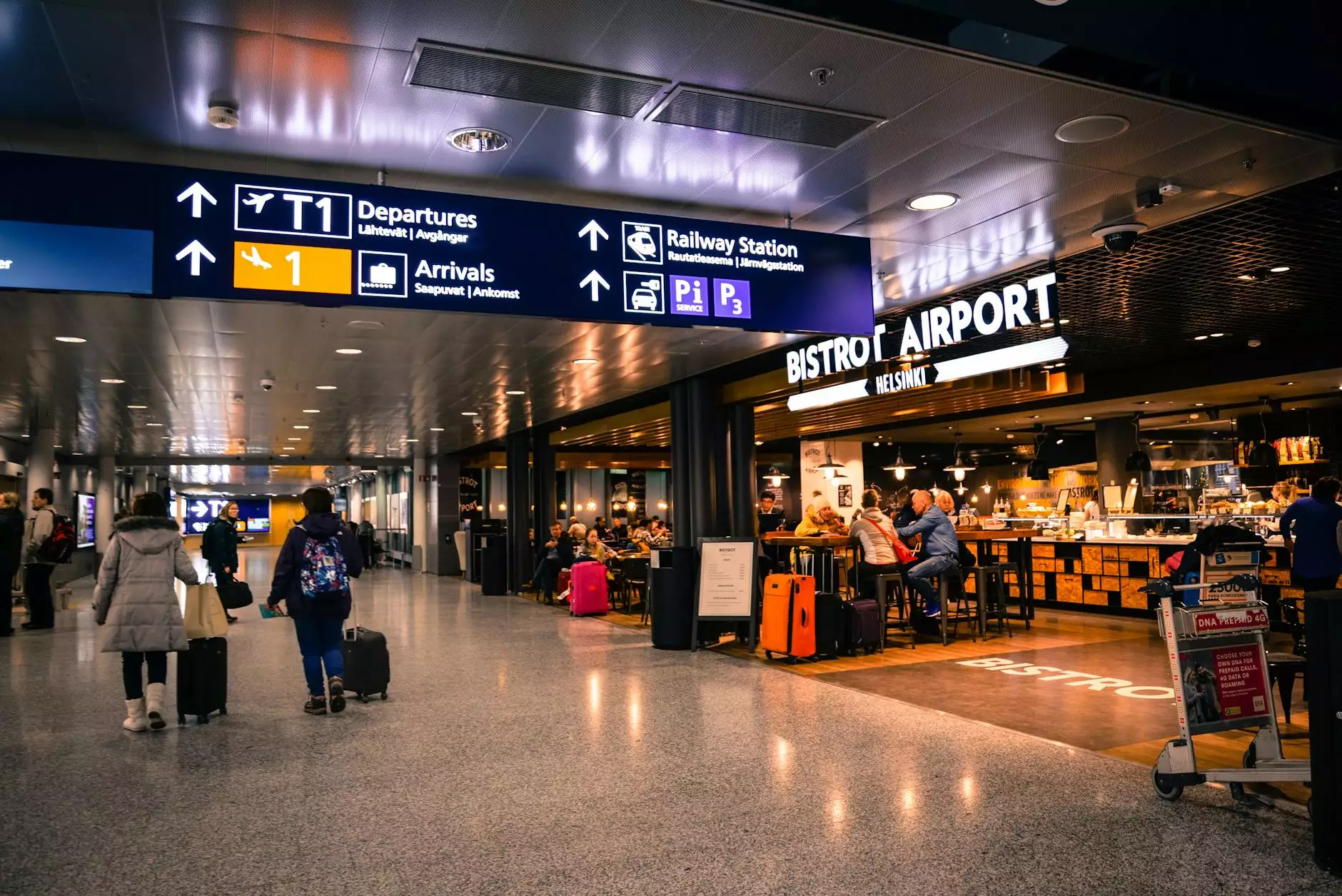Unlocking Business Potential with Advanced Air Tracking Cargo Solutions

In today's fast-paced global economy, the logistics and transportation industry plays a pivotal role in connecting markets, facilitating trade, and supporting business growth. Among the many technological advancements transforming this landscape, air tracking cargo has emerged as a game-changer, providing unmatched transparency, real-time updates, and operational efficiency. This comprehensive guide explores how innovative air cargo tracking techniques empower businesses, streamline operations at shipping centers, enhance transportation management, and optimize airport logistics.
Understanding the Significance of Air Tracking Cargo in Modern Business
In an era where instant communication and rapid delivery define competitive advantage, the ability to accurately monitor and manage air cargo is critical. Air tracking cargo integrates cutting-edge technologies such as GPS, RFID, IoT sensors, and cloud computing to provide real-time visibility of shipments from departure to arrival.
This technological integration not only ensures safety and security but also fosters accountability and transparency. Businesses can proactively respond to delays, optimize routes, and refine inventory management, ultimately leading to increased customer satisfaction and reduced operational costs.
Transforming Shipping Centers with Advanced Air Tracking
Enhancing Efficiency and Accuracy at Shipping Hubs
Shipping centers serve as the critical nodes in the air cargo supply chain. Precise and timely data about cargo status is essential to prevent delays and errors. Air tracking cargo solutions enable shipping centers to monitor cargo movements seamlessly through automated systems, reducing manual errors and improving throughput.
- Streamlined Operations: Automated check-ins, barcode scanning, and RFID tagging accelerate cargo processing.
- Real-Time Inventory Management: Accurate data allows for better stock control and faster dispatch.
- Improved Security: Continuous tracking ensures cargo integrity and enhances anti-theft measures.
Case Study: Seamless Integration in Leading Shipping Facilities
Many pioneering shipping centers now employ integrated air tracking cargo systems that sync with global logistics networks. For example, a major international shipping hub improved cargo turnaround time by 30% after implementing real-time tracking dashboards, which enabled staff to allocate resources more efficiently and anticipate cargo needs accurately.
Revolutionizing Transportation Networks Through Real-Time Cargo Visibility
Optimizing Routes and Reducing Delivery Times
Transportation management is at the heart of the entire logistics process. The ability to monitor cargo in transit through advanced air tracking solutions ensures that transportation providers can dynamically adjust routes based on current conditions such as weather, traffic, or unforeseen delays.
Real-time air tracking cargo data empowers carriers to make informed decisions, minimizing transit times and reducing fuel consumption. This results in cost savings and enhanced customer service levels, as shipments arrive precisely when expected.
Enhancing Collaboration Between Stakeholders
Effective supply chain communication requires transparency across all involved parties. Air tracking cargo systems facilitate data sharing among airlines, freight forwarders, customs authorities, and clients. This openness fosters trust and collaboration, leading to fewer disputes and smoother clearance processes.
The Role of Airports in the Air Cargo Ecosystem
Streamlining Airport Logistics with Intelligent Tracking
Airports are critical nodes that connect air cargo to the world’s markets. Implementing advanced air tracking cargo technology in airport logistics dramatically improves baggage handling, cargo clearance, and security procedures.
- Fast Customs Clearance: Real-time data simplifies documentation and reduces hold-up times at borders.
- Enhanced Security: Continuous monitoring of cargo movement deters theft and tampering.
- Better Resource Allocation: Ground staff can prioritize handling based on cargo urgency and critical needs.
Key Features of Modern Airport Cargo Tracking Solutions
- Automated RFID scanning systems that update cargo status instantly.
- Integration with airport management information systems for synchronized operations.
- Predictive analytics to forecast potential delays and proactively resolve issues.
The Strategic Advantages of Implementing Air Tracking Cargo for Business Growth
Boosting Customer Satisfaction and Loyalty
Real-time cargo tracking dramatically enhances transparency, enabling customers to track their shipments at every stage. This transparency fosters confidence and reduces customer inquiries, leading to higher satisfaction and loyalty.
Reducing Costs and Increasing Profit Margins
Accurate, timely information about cargo movements allows businesses to optimize inventory levels, reduce storage costs, and prevent costly delays. Additionally, proactive management minimizes penalties associated with late deliveries or lost cargo—directly impacting the bottom line.
Strengthening Security and Compliance
Advanced air tracking cargo systems monitor cargo throughout the entire journey, ensuring compliance with international security standards. This capability significantly reduces the risk of smuggling, theft, and tampering, protecting both business assets and reputation.
Technological Innovations Driving the Future of Air Cargo Tracking
Integration of IoT and Big Data
The Internet of Things (IoT) has revolutionized air cargo tracking by embedding sensors that provide continuous data on temperature, humidity, shock, and other environmental factors, crucial for sensitive shipments such as pharmaceuticals and perishables. Big data analytics further enhance decision-making by identifying patterns and predicting potential disruptions before they occur.
Artificial Intelligence and Machine Learning
AI-driven algorithms optimize routing, predict cargo demand, and automate problem-solving processes, reducing human error and increasing responsiveness. Machine learning models improve over time, ensuring more accurate and reliable tracking information.
Cloud-Based Platforms for Seamless Data Sharing
Cloud technology allows all stakeholders to access real-time data from anywhere, ensuring transparency and collaboration. These platforms support scalable solutions suitable for small businesses and large enterprises alike.
Implementing a Successful Air Tracking Cargo System: Best Practices
- Assess Business Needs: Understand your supply chain's specific requirements and set clear goals for cargo tracking.
- Select Compatible Technologies: Choose sensors, RFID, GPS, and software that integrate seamlessly into existing infrastructure.
- Ensure Data Security: Implement robust cybersecurity measures to protect sensitive cargo information.
- Train Personnel: Equip staff with the knowledge and skills to operate new systems effectively.
- Monitor and Optimize: Regularly review tracking data to identify bottlenecks and continuously improve processes.
Conclusion: Embracing Innovation for Competitive Edge
In conclusion, the strategic deployment of air tracking cargo solutions is transforming the landscape of international trade, shipping centers, transportation, and airports. These advanced systems not only enhance operational efficiency and security but also bolster customer trust and business resilience. As technology evolves, embracing innovative cargo tracking methods becomes essential for businesses aiming to thrive in an interconnected global marketplace.
By investing in state-of-the-art air cargo tracking platforms, organizations can unlock new levels of transparency, agility, and competitiveness—ensuring sustained growth and success in the dynamic world of air logistics.
For more information on leading air tracking cargo solutions and how they can elevate your business, visit cargobooking.aero and explore the innovative services designed to revolutionize your logistics operations.









